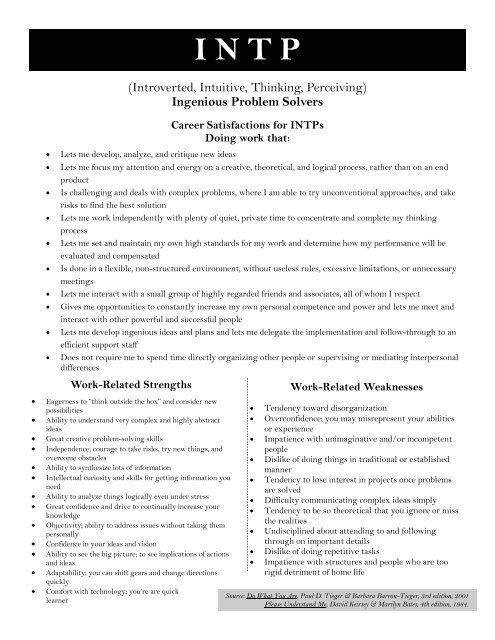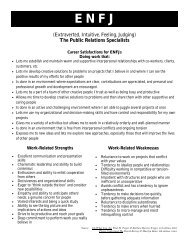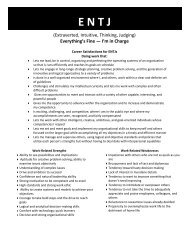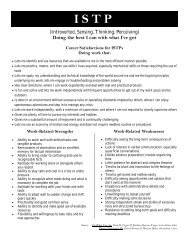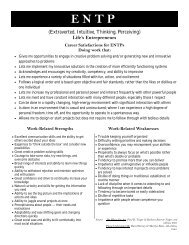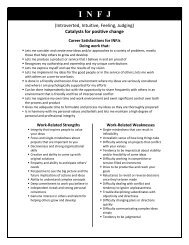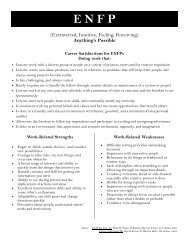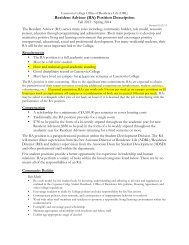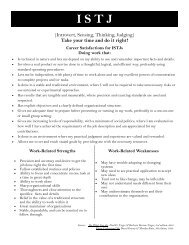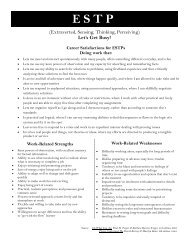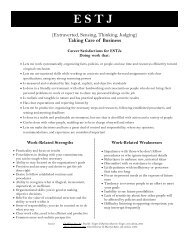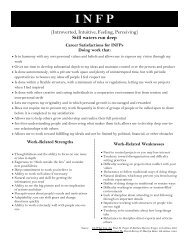INTP
INTPs - Cazenovia College
INTPs - Cazenovia College
You also want an ePaper? Increase the reach of your titles
YUMPU automatically turns print PDFs into web optimized ePapers that Google loves.
<strong>INTP</strong><br />
(Introverted, Intuitive, Thinking, Perceiving)<br />
Ingenious Problem Solvers<br />
<br />
<br />
<br />
<br />
<br />
<br />
<br />
<br />
<br />
<br />
<br />
<br />
<br />
<br />
<br />
<br />
<br />
<br />
<br />
<br />
<br />
<br />
<br />
Career Satisfactions for <strong>INTP</strong>s<br />
Doing work that:<br />
Lets me develop, analyze, and critique new ideas<br />
Lets me focus my attention and energy on a creative, theoretical, and logical process, rather than on an end<br />
product<br />
Is challenging and deals with complex problems, where I am able to try unconventional approaches, and take<br />
risks to find the best solution<br />
Lets me work independently with plenty of quiet, private time to concentrate and complete my thinking<br />
process<br />
Lets me set and maintain my own high standards for my work and determine how my performance will be<br />
evaluated and compensated<br />
Is done in a flexible, non-structured environment, without useless rules, excessive limitations, or unnecessary<br />
meetings<br />
Lets me interact with a small group of highly regarded friends and associates, all of whom I respect<br />
Gives me opportunities to constantly increase my own personal competence and power and lets me meet and<br />
interact with other powerful and successful people<br />
Lets me develop ingenious ideas and plans and lets me delegate the implementation and follow-through to an<br />
efficient support staff<br />
Does not require me to spend time directly organizing other people or supervising or mediating interpersonal<br />
differences<br />
Work-Related Strengths<br />
Eagerness to “think outside the box” and consider new<br />
possibilities<br />
Ability to understand very complex and highly abstract<br />
ideas<br />
Great creative problem-solving skills<br />
Independence; courage to take risks, try new things, and<br />
overcome obstacles<br />
Ability to synthesize lots of information<br />
Intellectual curiosity and skills for getting information you<br />
need<br />
Ability to analyze things logically even under stress<br />
Great confidence and drive to continually increase your<br />
knowledge<br />
Objectivity; ability to address issues without taking them<br />
personally<br />
Confidence in your ideas and vision<br />
Ability to see the big picture; to see implications of actions<br />
and ideas<br />
Adaptability; you can shift gears and change directions<br />
quickly<br />
Comfort with technology; you’re are quick<br />
learner<br />
<br />
<br />
<br />
<br />
<br />
<br />
<br />
<br />
<br />
<br />
Work-Related Weaknesses<br />
Tendency toward disorganization<br />
Overconfidence; you may misrepresent your abilities<br />
or experience<br />
Impatience with unimaginative and/or incompetent<br />
people<br />
Dislike of doing things in traditional or established<br />
manner<br />
Tendency to lose interest in projects once problems<br />
are solved<br />
Difficulty communicating complex ideas simply<br />
Tendency to be so theoretical that you ignore or miss<br />
the realities<br />
Undisciplined about attending to and following<br />
through on important details<br />
Dislike of doing repetitive tasks<br />
Impatience with structures and people who are too<br />
rigid detriment of home life<br />
Source: Do What You Are, Paul D. Tieger & Barbara Barron-Tieger, 3rd edition, 2001<br />
Please Understand Me, David Keirsey & Marilyn Bates, 4th edition, 1984.
Computers/Technology<br />
Computer software designer<br />
Computer programmer<br />
Research and development specialist<br />
Systems analyst/database manager<br />
Strategic planner<br />
New market or product conceptualizer<br />
Information services developer—computer<br />
programming; new business developer<br />
Network integration specialist<br />
Change management consultant<br />
Financial planner<br />
Investment banker<br />
Management consultant: computer/<br />
information services, marketing,<br />
reorganization<br />
Desktop publishing specialist<br />
Webmaster<br />
Programmer<br />
Network administrator<br />
Internet architect<br />
Analyst<br />
Web developer<br />
Computer animator<br />
Computer engineer<br />
Java programmer/analyst<br />
Business analyst<br />
Software developer<br />
Health Care/Technical<br />
Neurologist<br />
Physicist<br />
Plastic surgeon<br />
Pharmacist<br />
Scientist: chemistry/biology<br />
Pharmaceutical researcher<br />
Biomedical engineer/researcher<br />
Veterinarian<br />
Microbiologist<br />
Geneticist<br />
Popular Occupations for <strong>INTP</strong>s<br />
<br />
<br />
<br />
<br />
<br />
<br />
<br />
<br />
<br />
<br />
<br />
<br />
<br />
<br />
<br />
<br />
<br />
<br />
<br />
<br />
<br />
<br />
<br />
<br />
<br />
<br />
<br />
<br />
<br />
<br />
<br />
<br />
<br />
<br />
<br />
<br />
<br />
<br />
Investigator<br />
Intellectual property attorney<br />
Legal mediator<br />
Corporate finance attorney<br />
Psychiatrist<br />
Entrepreneur<br />
Venture capitalist<br />
Business analyst<br />
Entertainment agent<br />
Physicist<br />
Biophysicist<br />
Anthropologist<br />
Intelligence specialist<br />
Academic<br />
Mathematician<br />
Archaeologist<br />
Historian<br />
Philosopher<br />
College teacher of advanced students<br />
Researcher<br />
Logician<br />
College faculty administrator<br />
Economist<br />
Interpreter/translator<br />
Astronomer<br />
Creative<br />
Photographer<br />
Creative writer<br />
Artist<br />
Entertainer/dancer<br />
Musician<br />
Agent<br />
Inventor<br />
Informational-graphics designer<br />
Columnist, critic, commentator<br />
Music arranger and orchestrator<br />
Producer<br />
Director: stage, motion pictures<br />
Film editor<br />
Art director<br />
Professional/Business<br />
<br />
<br />
<br />
<br />
<br />
Lawyer<br />
Economist<br />
Psychologist/psychoanalyst<br />
Financial analyst<br />
Architect<br />
This list is meant to give ideas you may not have considered, but is not a comprehensive listing of every career that you might enjoy or find success in.
Portrait of an <strong>INTP</strong><br />
<strong>INTP</strong>s exhibit the greatest precision in thought and language of all the types; they tend to see distinctions<br />
and inconsistencies in thought and language instantaneously. The one word which captures the unique style of<br />
<strong>INTP</strong>s is architect—the architect of ideas and systems as well as the architect of edifices. This type is found in only<br />
1% of the population and therefore is not encountered as frequently as some of the other types.<br />
Authority derived from office, position, or wide acceptance does not impress <strong>INTP</strong>s. Only statements that<br />
are logical and coherent carry weight. External authority per se is irrelevant. <strong>INTP</strong>s abhor redundancy and<br />
incoherence. Possessing a desire to understand the universe, an <strong>INTP</strong> is constantly looking for natural law.<br />
Curiosity concerning these keys to the universe is a driving force in this type.<br />
<strong>INTP</strong>s detect contradictions in statements no matter how distant in space or time the contradictory<br />
statements were produced. The intellectual scanning of <strong>INTP</strong>s has a principled quality; that is, <strong>INTP</strong>s search for<br />
whatever is relevant and pertinent to the issue at hand. Consequently, <strong>INTP</strong>s can concentrate better than any<br />
other type.<br />
<strong>INTP</strong>s prize intelligence in themselves and in others, but can become intellectual dilettantes as a result of<br />
their need to amass ideas, principles, or understanding behavior. And once they know something, it is remembered.<br />
<strong>INTP</strong>s can become obsessed with analysis. Once caught up in a though process, that thought process seems to have<br />
a will of its own to <strong>INTP</strong>s, and they persevere until the issue is comprehended in all its complexity. They can be<br />
intellectual snobs and may show impatience at times with others less endowed intellectually. This quality, <strong>INTP</strong>s<br />
find, generates hostility and defensive behaviors on the part of others, who may describe an <strong>INTP</strong> as arrogant.<br />
For <strong>INTP</strong>s, the world exists primarily to be understood. Reality is trivial, a mere arena for providing ideas.<br />
It is essential that the universe is understood and that whatever is stated about the universe is stated correctly, with<br />
coherence and without redundancy. This is the <strong>INTP</strong>’s final purpose. It matters not whether others understand or<br />
accept his or her truths.<br />
The <strong>INTP</strong> is the logician, the mathematician, the philosopher, the scientist; any pursuit requiring<br />
architecture of ideas intrigues this type. <strong>INTP</strong>s should not, however, be asked to work out the implementation or<br />
application of their models to the real world. The <strong>INTP</strong> is the architect of a system and leaves it to others to be the<br />
builder and the applicator. Very often, therefore, the <strong>INTP</strong>’s work is not credited to him or her. The builder and<br />
the applier gains fame and fortune, while the <strong>INTP</strong>’s name remains obscure. Appreciation of an <strong>INTP</strong>’s theoretical<br />
work frequently comes posthumously—or the work may never be removed from library shelves at all and thus lost.<br />
<strong>INTP</strong>s tend not to be writers or to go into sales work. They are, however, often excellent teachers,<br />
particularly for advanced students, although <strong>INTP</strong>s do not always enjoy much popularity, for they can be hard<br />
task-masters. They are not good at clerical tasks and are impatient with routine details. They prefer to work<br />
quietly, without interruption, and often alone. If an organization is to use the talents of an <strong>INTP</strong> appropriately, the<br />
<strong>INTP</strong> must be given an efficient support staff who can capture ideas as they emerge and before the <strong>INTP</strong> loses<br />
interest and turns to another idea.<br />
<strong>INTP</strong>s take their mating relationship seriously and usually are faithful and devoted-albeit preoccupied at<br />
times. They are not likely to welcome constant social activity or disorganization in the home. In all probability,
the mate of an <strong>INTP</strong> will initiate and manage a social life. If left to his or her own devices, the <strong>INTP</strong> mate will<br />
retreat into the world of books and emerge only when physical needs become imperative. <strong>INTP</strong>s are, however,<br />
willing, compliant, and easy to live with, although somewhat forgetful of appointments, anniversaries, and the<br />
rituals of daily living unless reminded. They may have difficulty expressing their emotions verbally, and the mate<br />
of an <strong>INTP</strong> may believe that he/she is somewhat taken for granted. As a parent, the <strong>INTP</strong> is devoted; they enjoy<br />
children, and are serious about their upbringing. The home of the <strong>INTP</strong> parent is usually calm, low-key in<br />
discipline, but well run and ordered.<br />
<strong>INTP</strong>s deal with the environment primarily through intuition, and their strongest quality, the thinking<br />
function, remains relatively hidden except in close associations. Therefore, <strong>INTP</strong>s are often misunderstood, seen as<br />
difficult to know, and seldom perceived at their true level of competency. They are inclined to be shy except when<br />
with close friends, and their reserve is difficult to penetrate. They are very adaptable until one of their principles is<br />
violated. Then <strong>INTP</strong>s are not adaptable at all! They may have difficulty in a complicated fashion and want to be<br />
precise, never redundant in their communications. Because their feeling qualities may be underdeveloped, they may<br />
be insensitive to the wants and wishes of others, often quite unaware of the existence of these wants and wishes.<br />
Using your strengths is easy.<br />
The secret to success for an <strong>INTP</strong> is learning to:<br />
BE BETTER ORGANIZED, BE PATIENT WITH LESS INTELLIGENT PEOPLE,<br />
AND WORK AT IMPROVING YOUR SOCIAL SKILLS.


